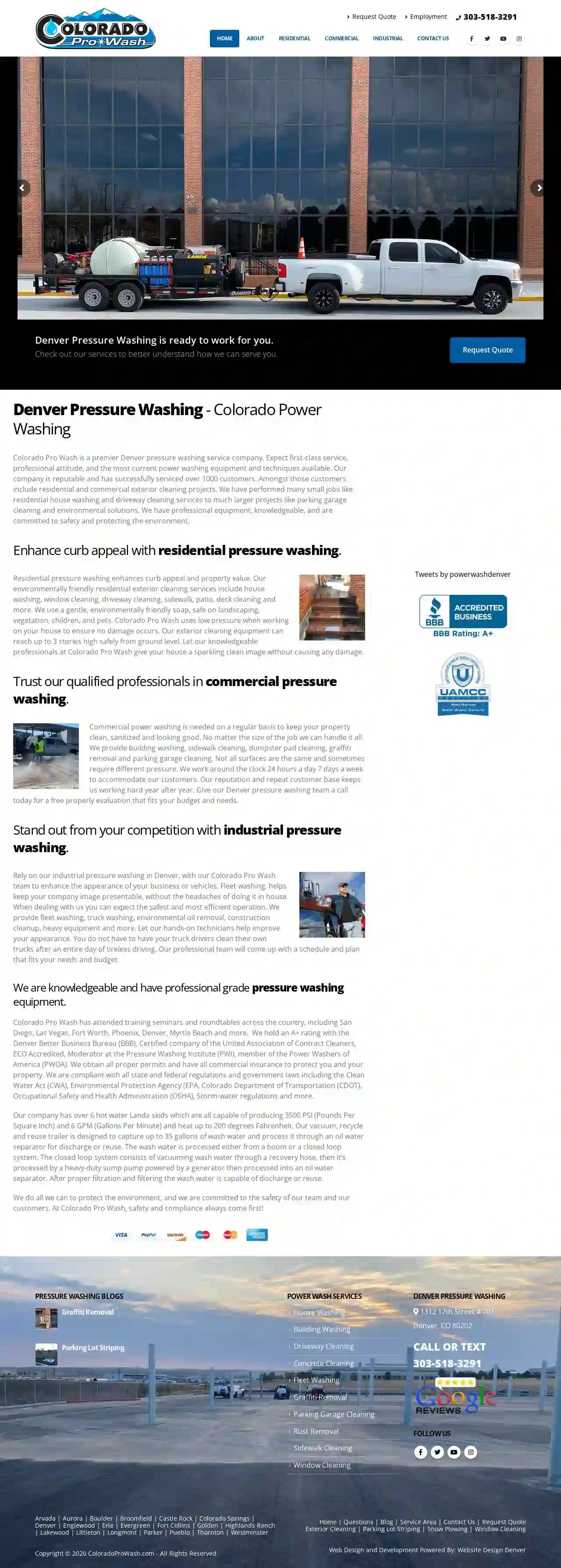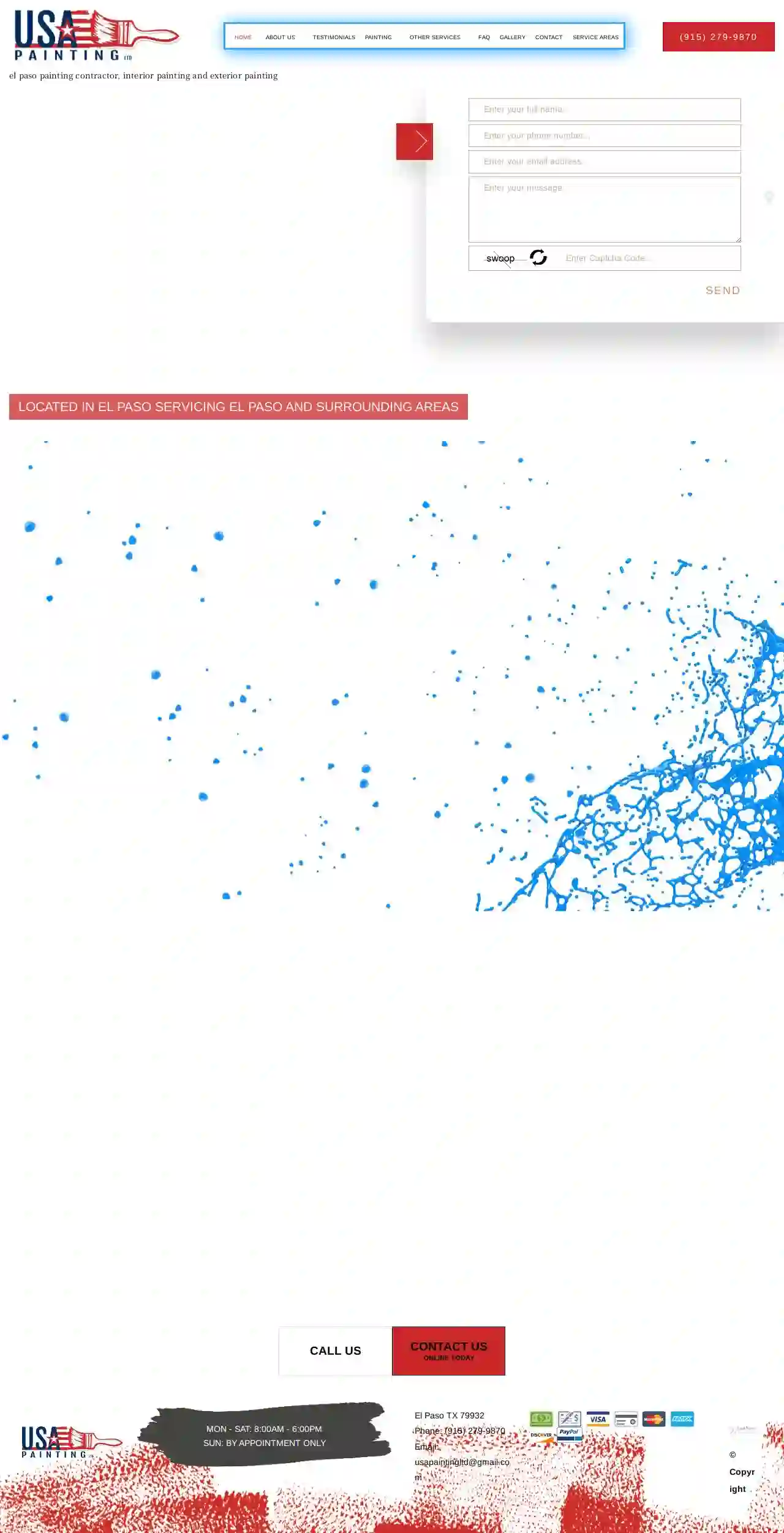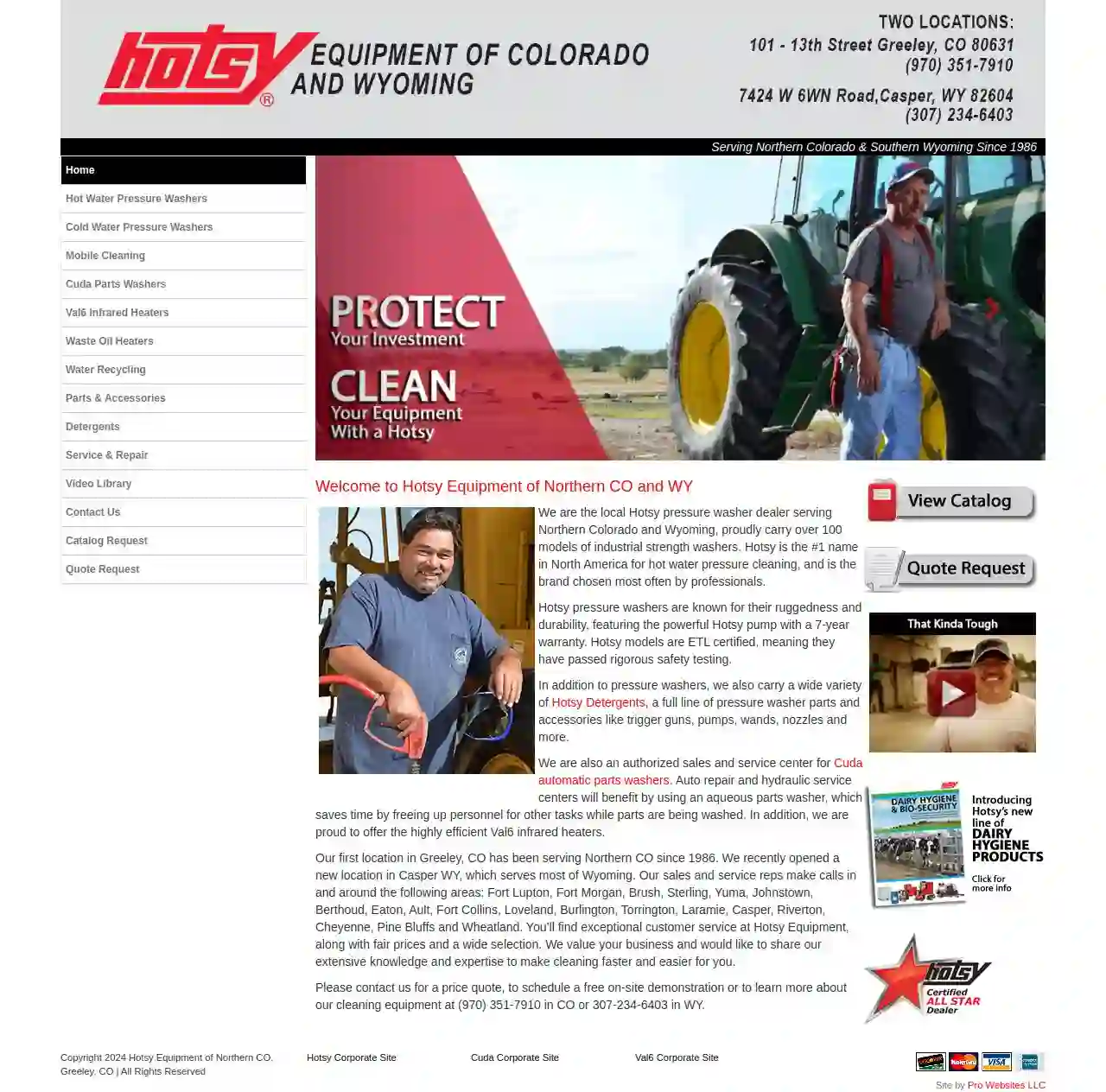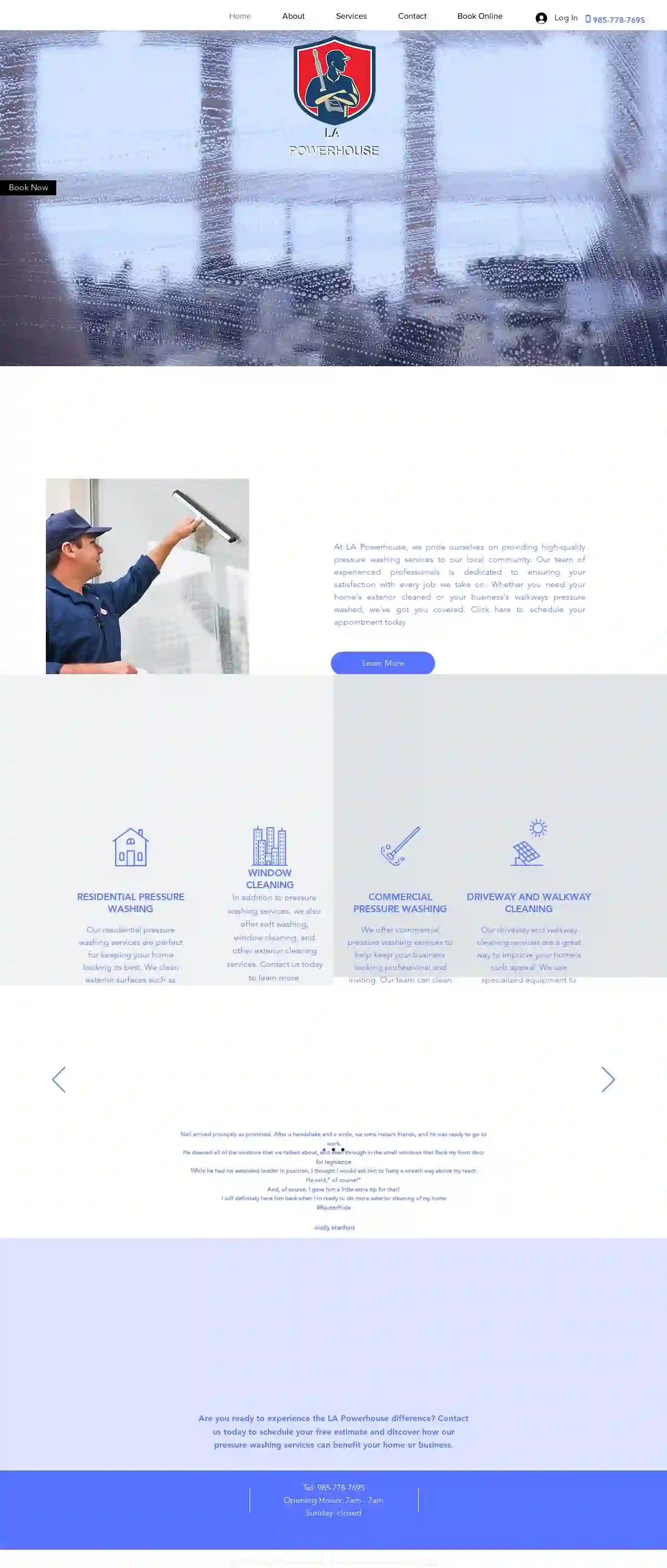Pressure Washing Salida
Top 10 Power Washing in Salida
Get 3 FREE Pressure Washing quotes for your project today! Compare profiles, reviews, accreditations, portfolio, etc... and choose the best service.

Power Washing Pros
517 reviewsThibodaux, LA, 2572 Talbot Ave, 70301, USPower Washing Pros LLC is a trusted name in pressure washing services in Thibodaux, providing high-quality and affordable services to residential and commercial properties. With 10 years of experience and OSHA 50 certification, they offer a wide variety of services including building washing, commercial pressure washing, deck & fence cleaning, and more. Their commitment to customer satisfaction and dedication to improving the aesthetics and durability of homes and businesses in Southern Louisiana sets them apart.
- Services
- Why Us?
- Accreditations
- Our Team
- Testimonials
- Gallery
Get Quote
Colorado Pro Wash
Denver, USColorado Pro Wash is a professional pressure washing company serving the Denver area and Southern Colorado. We offer a wide range of services including residential and commercial pressure washing, concrete cleaning, driveway cleaning, rust removal, and more. Our team is dedicated to providing exceptional service and ensuring customer satisfaction. With years of experience and a commitment to quality, we are the go-to choice for pressure washing in the Denver area.
- Services
- Why Us?
- Accreditations
- Our Team
- Testimonials
- Gallery
Get Quote
USA Painting Ltd.
El Paso, 79932, USUSA Painting Ltd. is a team of dedicated local painters serving El Paso and surrounding areas. We are committed to providing the best painting services, treating every building as if it were our own. We believe in building lasting relationships with our customers, treating them like neighbors and ensuring their satisfaction. Our team is fully trained and experienced, using high-quality tools and materials to deliver exceptional results. We offer a wide range of services, from commercial to residential, interior to exterior, and everything in between. Whether you need a simple touch-up or a complete makeover, USA Painting Ltd. is here to help you achieve your vision.
- Services
- Why Us?
- Testimonials
- Gallery
Get Quote
Colorado Wash Services
54 reviews970-712-7937, 970, USWhen you need it pressure wash clean. We provide pressure wash cleaning services for COMMERCIAL and RESIDENTIAL projects.
- Services
- Why Us?
- Accreditations
- Gallery
Get Quote
Hotsy Equipment Of Northern Colorado
518 reviews1234 Main St, Suite A, Greeley, 80631, USHotsy Equipment of Northern CO and WY is a local Hotsy pressure washer dealer serving Northern Colorado and Wyoming. They carry over 100 models of industrial strength washers and offer a wide variety of Hotsy Detergents, pressure washer parts, and accessories. They are also an authorized sales and service center for Cuda automatic parts washers and offer Val6 infrared heaters. Their sales and service reps serve areas including Fort Lupton, Fort Morgan, Brush, Sterling, Yuma, Johnstown, Berthoud, Eaton, Ault, Fort Collins, Loveland, Burlington, Torrington, Laramie, Casper, Riverton, Cheyenne, Pine Bluffs, and Wheatland.
- Services
- Why Us?
- Accreditations
- Our Team
- Testimonials
- Gallery
Get Quote
Accelerated Pressure Cleaning LLC
531 reviews414 SUMMERFEST DR, Lafayette, 70507, USAccelerated Pressure Cleaning is a locally owned business serving Lafayette, Carencro, Broussard, and surrounding areas in Louisiana. With over 13 years of experience, they specialize in professional pressure washing and soft washing services for residential properties. Their team is dedicated to providing quality and professional services, ensuring customer satisfaction. They understand the importance of maintaining a clean and grime-free property and offer a range of services to meet client needs, including pressure washing, soft washing, roof washing, wood fence/deck restoration, and rust removal. Accelerated Pressure Cleaning prides itself on using environmentally friendly methods and providing free, accurate estimates.
- Services
- Why Us?
- Gallery
Get Quote
Lightning Mobile Services
533 reviewsCommerce City, CO, 9752 East Hanover Court, 80640, USLightning Mobile Services has been providing quality exterior property maintenance and restoration services to property managers in the Denver Metro area for over 35 years. Their services include routine maintenance, preventive programs, landscaping, welding, car and truck wash cleaning, pressure washing, graffiti removal, media blasting, snow removal, and more. Their goal is to help create a safe and functional environment for tenants or employees while maintaining the property's value and appeal.
- Services
- Why Us?
- Accreditations
- Our Team
- Testimonials
- Gallery
Get Quote
Bayou Boys Soft Washing LLC
51 reviewsLafayette, LA, PO Box 51752, 70505, USBayou Boys Soft Washing is a local business offering professional soft washing services in the Acadiana area. They provide a variety of services including pressure washing, soft washing, gutter maintenance, sidewalk maintenance cleaning, and more. Their team is experienced, insured, and reliable, and they offer contracts for their services. They cater to both residential and commercial properties and are ready to tackle any cleaning job.
- Services
- Why Us?
- Our Team
- Testimonials
- Gallery
Get Quote
All American Pressure Washing
512 reviews715 interlakin dr, N/A, New Iberia, 70563, USAll American Pressure Washing LLC is your go-to choice for reliable pressure washing services in New Iberia, LA. More than just pressure washing, our committed staff provides various services. Whether you need a thorough roof cleaning to extend the life of your shingles or want to give your home a fresh look with our house cleaning expertise, we’ve got you covered. We take pride in revitalizing driveways, patios, and fences to their pristine condition and ensuring your deck is safe and inviting. Our services don’t stop there; we also specialize in rust stain removal, building cleaning, and storefront cleaning to keep your commercial spaces looking their best. Additionally, our parking lot striping services ensure your clients’ parking is well-organized and secure. In contrast, our graffiti removal and dumpster pad cleaning services help maintain a clean and graffiti-free environment. For all your cleaning requirements, rely on reliable pressure washing services and discover the distinction in cleanliness and client happiness that makes us stand out in New Iberia, Louisiana.
- Services
- Why Us?
- Accreditations
- Our Team
- Testimonials
- Gallery
Get Quote
LA Powerhouse Pressure Washing LLC
516 reviewsLafayette, USAt LA Powerhouse, we pride ourselves on providing high-quality pressure washing services to our local community. Our team of experienced professionals is dedicated to ensuring your satisfaction with every job we take on. Whether you need your home's exterior cleaned or your business's walkways pressure washed, we've got you covered. Our residential pressure washing services are perfect for keeping your home looking its best. We clean exterior surfaces such as siding, decks, and patios to remove dirt, grime, and other buildup that can cause damage over time. We offer commercial pressure washing services to help keep your business looking professional and inviting. Our team can clean exterior surfaces such as sidewalks, entryways, and parking lots to remove dirt, gum, and other unsightly buildup. Our driveway and walkway cleaning services are a great way to improve your home's curb appeal. We use specialized equipment to remove dirt, oil, and other stains from your concrete and paver surfaces. In addition to pressure washing services, we also offer soft washing, window cleaning, and other exterior cleaning services.
- Services
- Why Us?
- Testimonials
- Gallery
Get Quote
Over 60,241+ Janitorial Contractors on our directory
Our janitorial services operate in Salida & surrounding areas!
CleaningMatch has curated and vetted the Best Cleaning Services in and around Salida. Find a top & trustworthy pro today.
Frequently Asked Questions About Pressure Washing
- Spring and Fall: Spring and fall are often ideal for pressure washing as the temperatures are moderate and the weather is typically dry.
- Summer: Pressure washing can be done in the summer, but avoid doing so during the hottest part of the day to prevent the cleaning solutions from drying too quickly and leaving streaks.
- Winter: Pressure washing is possible in the winter, but be mindful of freezing temperatures that can affect cleaning solutions and cause slippery surfaces.
- Soft Washing: Soft washing is generally recommended for wood decks as it uses lower pressure and specialized cleaning solutions to safely remove dirt, mildew, and algae without causing damage.
- Lower Pressure Setting: If using a pressure washer on a wood deck, use a lower pressure setting (around 1500 PSI) and a wide-angle nozzle (25-40 degrees).
- Maintain Distance: Hold the nozzle at least 12 inches away from the deck surface to prevent etching or splintering.
- Professional Pressure Washing: If you're unsure about pressure washing your deck safely, hire a professional pressure washing company with experience in cleaning wood surfaces.
- Clear Obstructions: Remove any objects, furniture, or debris from the areas to be pressure washed.
- Close Windows and Doors: Securely close all windows and doors to prevent water or cleaning solutions from entering your home or building.
- Cover Delicate Surfaces: Protect delicate plants, landscaping, or electrical outlets with tarps, plastic sheeting, or painter's tape.
- Inform Your Neighbors: It's a courtesy to inform your neighbors about the scheduled pressure washing, especially if noise or overspray is a concern.
- Communicate Special Instructions: Inform the pressure washing company about any specific areas you want them to focus on or avoid.
- Wood Siding: High-pressure washing can damage wood fibers, leading to splintering or etching. Soft washing is the recommended method for cleaning wood siding.
- Asphalt Shingles: High-pressure water can dislodge granules from asphalt shingles, reducing their lifespan. Soft washing is a gentler alternative for roof cleaning.
- Painted Surfaces: High pressure can strip paint from surfaces. Always test pressure washing on an inconspicuous area before cleaning painted surfaces.
- Windows and Screens: The force of pressure washing can break windows or damage delicate window screens. Traditional cleaning methods are better suited for windows and screens.
What is the best time of year for pressure washing?
Choose a day with mild temperatures and dry weather for optimal pressure washing results. Avoid pressure washing in extreme heat, freezing temperatures, or rainy conditions.
Can pressure washing damage my deck?
By using the right cleaning method and precautions, you can effectively clean your wood deck without causing damage and prolong its lifespan.
How do I prepare my property for pressure washing?
By taking these preparatory steps, you can ensure a safe and efficient pressure washing experience.
Is pressure washing safe for all surfaces?
Always consult with a professional pressure washing company to determine the appropriate cleaning method for your specific surfaces.
What is the best time of year for pressure washing?
- Spring and Fall: Spring and fall are often ideal for pressure washing as the temperatures are moderate and the weather is typically dry.
- Summer: Pressure washing can be done in the summer, but avoid doing so during the hottest part of the day to prevent the cleaning solutions from drying too quickly and leaving streaks.
- Winter: Pressure washing is possible in the winter, but be mindful of freezing temperatures that can affect cleaning solutions and cause slippery surfaces.
Choose a day with mild temperatures and dry weather for optimal pressure washing results. Avoid pressure washing in extreme heat, freezing temperatures, or rainy conditions.
Can pressure washing damage my deck?
- Soft Washing: Soft washing is generally recommended for wood decks as it uses lower pressure and specialized cleaning solutions to safely remove dirt, mildew, and algae without causing damage.
- Lower Pressure Setting: If using a pressure washer on a wood deck, use a lower pressure setting (around 1500 PSI) and a wide-angle nozzle (25-40 degrees).
- Maintain Distance: Hold the nozzle at least 12 inches away from the deck surface to prevent etching or splintering.
- Professional Pressure Washing: If you're unsure about pressure washing your deck safely, hire a professional pressure washing company with experience in cleaning wood surfaces.
By using the right cleaning method and precautions, you can effectively clean your wood deck without causing damage and prolong its lifespan.
How do I prepare my property for pressure washing?
- Clear Obstructions: Remove any objects, furniture, or debris from the areas to be pressure washed.
- Close Windows and Doors: Securely close all windows and doors to prevent water or cleaning solutions from entering your home or building.
- Cover Delicate Surfaces: Protect delicate plants, landscaping, or electrical outlets with tarps, plastic sheeting, or painter's tape.
- Inform Your Neighbors: It's a courtesy to inform your neighbors about the scheduled pressure washing, especially if noise or overspray is a concern.
- Communicate Special Instructions: Inform the pressure washing company about any specific areas you want them to focus on or avoid.
By taking these preparatory steps, you can ensure a safe and efficient pressure washing experience.
Is pressure washing safe for all surfaces?
- Wood Siding: High-pressure washing can damage wood fibers, leading to splintering or etching. Soft washing is the recommended method for cleaning wood siding.
- Asphalt Shingles: High-pressure water can dislodge granules from asphalt shingles, reducing their lifespan. Soft washing is a gentler alternative for roof cleaning.
- Painted Surfaces: High pressure can strip paint from surfaces. Always test pressure washing on an inconspicuous area before cleaning painted surfaces.
- Windows and Screens: The force of pressure washing can break windows or damage delicate window screens. Traditional cleaning methods are better suited for windows and screens.
Always consult with a professional pressure washing company to determine the appropriate cleaning method for your specific surfaces.